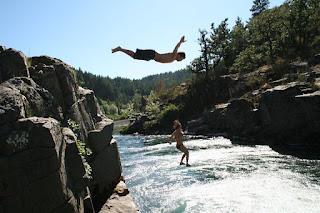A word I heard quite often last week at a conference of teachers on seminar style instruction: “harm.” As in: how can we make sure our students are not harmed by what happens during class discussions? As one participant put it “the texts we assign may do harm to some students and we might or might not be aware of it. We need to move this burden onto the educator. It’s our job to protect and deflect and make sure everybody is supported.”
Earlier in the week, we’d watched a video showing an “adventure playground” where “kids are encouraged to participate in healthy risk-taking.” Adults lurk around the edges removing hidden hazards, like rusty nails. But mostly they leave the kids alone, and refrain from interfering in risky behavior like climbing too far out on a thin tree limb 20 feet off the ground. “Even when you feel uncomfortable, that should not inform your next move,” the adult says afterwards. Children experience danger. They are allowed to light fires and wield hammers and wallow in mud puddles.
Adventure playgrounds were conceived by Margory Allen of Hurtwood (1897-1976) who said: “it is better to risk a broken leg than a broken spirit. A leg can always mend. A spirit may not.”
It reminded me of my childhood, though no one was getting rid of rusty nails around the forts we built in the woods far away from the parental gaze. A trip to the doctor for a tetanus shot and to get the sneaker bits removed from your foot was a rite of passage in our neighborhood. We also rode bikes and cars without helmets and or seatbelts. One study found that kids today experience a total of 7 minutes per week of play unsupervised by adults.
How is it that as we parents of the post-missing-child-milk-carton era have made childhood increasingly safe, our children have become so increasingly anxious and sad? Maybe Ms. Allen was right. Maybe danger is good for the spirit.
References
Latest news about the bubble wrap generation. Just before I posted, these two pieces showed up in news sources I consume.
This article appeared on the front page of the Atlantic website on July 5: "The Gravitational Pull of Supervising Kids All the Time," by Stephanie H. Murray. It traces the rise of safetyism in parenting, which is closely related to safetyism at school and around the Harkness table.

No comments:
Post a Comment